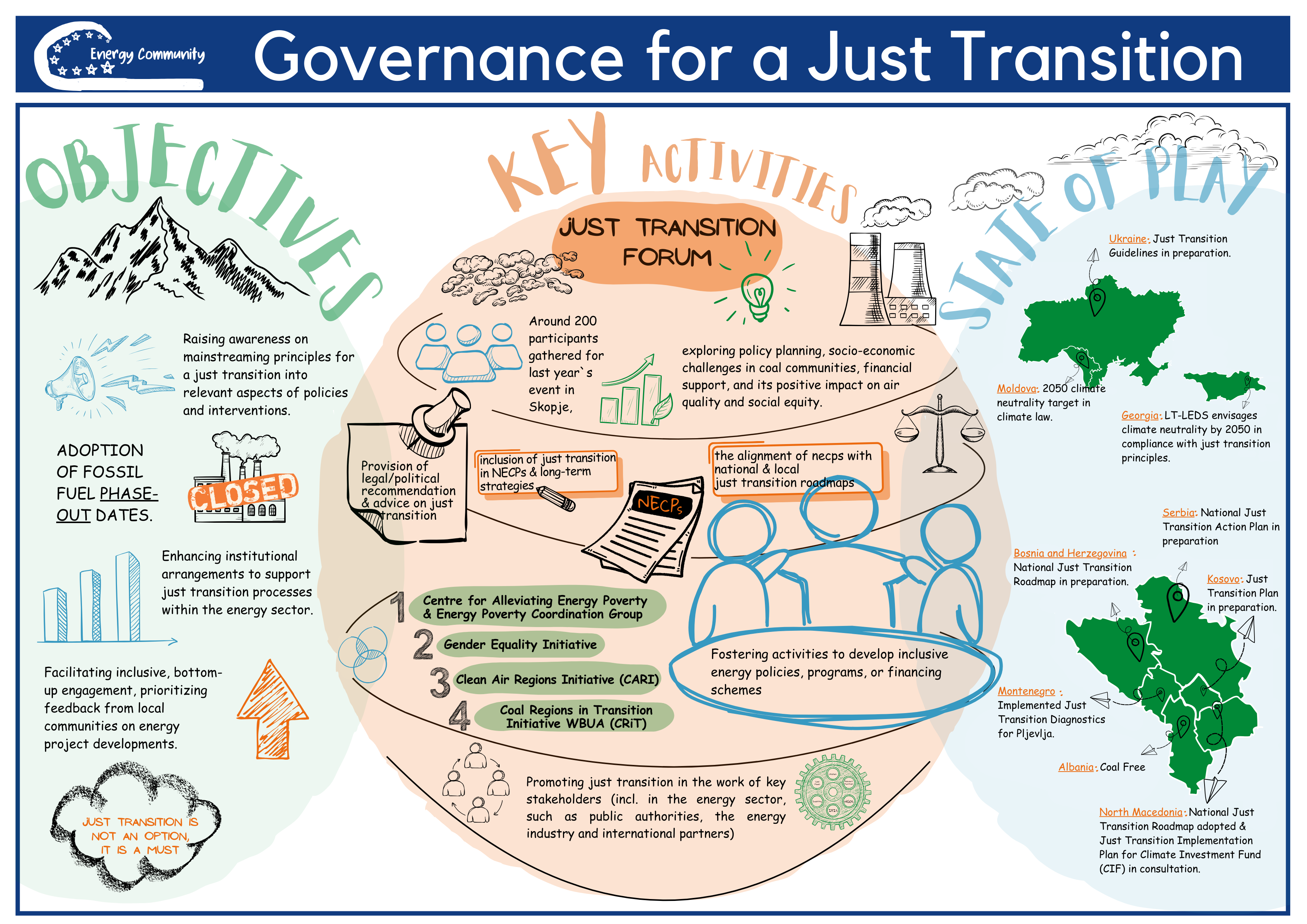Governance for a Just Transition
In order to be considered just and inclusive, energy transition processes need to ensure full recognition of rights and labour contributions, equal participation in decision-making processes and fairness, taking into account the various dimensions of just transition. Thus, just transition is a future-oriented concept, driven by a set of principles, processes and practices that aim to “Greening the economy in a way that is as fair and inclusive as possible to everyone concerned, creating decent work opportunities and leaving no one behind” (ILO, 2022).
Against this backdrop, concrete steps are also needed in the Energy Community to ensure that a move away from fossil fuels in the Contracting Parties is socially just, in the interest of women, workers and entire communities.
The objectives of the Energy Community Just Transition Initiative are to:
- Enhance institutional arrangements that support just transformations in the energy sector.
- Provide support and guidance on the integration and alignment of just transition principles, processes and practices in relevant policy strategies and interventions, including National Energy and Climate Plans, Long-term strategies and just transition plans.
- Facilitate inclusive, bottom-up engagement, where policymakers prioritize the feedback from local communities on energy project developments.
- Promote cross-sectoral projects between the energy sector (industry, coal mines, utilities) and other departments (such as the public sector, academia, innovation hubs, IFIs) to develop inclusive energy policies, programs, and financing schemes.
- Encourage regular communication and exchange of best practices in the fields of just transition, energy poverty, gender equality, coal regions in transition and clean air.

Just transition dimensions in brief

-
Energy Poverty
Energy Poverty
Energy poverty is commonly defined as the inability to secure an adequate level of energy services in the household. It is a complex, structural problem that can be caused by low household income, high energy prices, and high energy demand, among other factors. The most effective long-term measures to address energy poverty are those based on energy efficiency measures.
In 2021, the Energy Community Secretariat published a study on energy poverty aimed at identifying and assessing the number of households affected by energy poverty in the region and proposing strategies and measures to combat it. One year later, the Energy Community Secretariat established an Energy Poverty Coordination Group in 2022, gathering representatives from ministries responsible for energy policy and social affairs to regularly discuss energy poverty activities. Published in August 2022, the Policy Guidelines on identifying and addressing Energy Poverty in the Energy Community Contracting Parties are designed with a view to assist the Energy Community Contracting Parties in supporting the most vulnerable categories of energy consumers.
The Center for Combating Energy Poverty aims to further facilitate activities regarding:
- The creation of a database and long-term mechanism to monitor the extent of energy poverty in the Contracting Parties;
- Addressing energy poverty through energy efficiency policies and measures, including prioritization of building retrofit programs;
- Establishing ongoing collaboration with the Energy Poverty Observatory and facilitating the involvement of Contracting Parties.
-
Gender Equality
Gender Equality
Inequalities can persist in green energy systems, as energy interventions do not automatically tackle the structural dynamics embedded within socio-cultural and socio-economic contexts. Also, in general, the proportion of women engaged in the energy transition is still low, especially as we expect the sustainable energy sector to grow significantly in the next decades, with approximately 42 million jobs by 2050.1
This project will ensure that a move away from fossil fuels, instead of replicating existing inequalities, will give women a place at the table where energy transitions are discussed and shaped. Leveraging on existing guidance from the Paris Agreement, the EU and the UN, the Energy Community Secretariat will support the inclusion of the gender dimension in the just energy transition of its Contracting Parties by addressing, among other things:- ensuring equal representation in decision-making processes, projects and events in relation to energy;
- promoting education and training of women on business management, sustainable energy technology and renewables;
- actively participating to international and regional energy initiatives on gender and energy;
- considering the need to conduct gender impact assessments (GIA) alongside environmental and social impact assessments;
- collecting better gender-disaggregated data across sectors for sectoral studies.
1 IRENA, Renewable Energy: A Gender Perspective, January 2019
-
Coal Regions in Transition
Coal Regions in Transition
The Coal Regions in Transition Project for Western Balkans and Ukraine is a joint effort of the principals (European Commission, Energy Community, World Bank, EBRD, College of Europe, Government of Poland) who are working together on cooperation with partners in the Western Balkans and Ukraine to deliver knowledge to coal regions and governments, principally through meetings and the Coal Regions in Transition Learning Academy. Knowledge to be delivered pertains to planning and preparing for transition.
In addition, the project will bring financial resources to assist selected regions in identifying and implementing pilot projects. The establishment of the initiative aims to facilitate the development of transition strategies and projects to kick start the transition process in the coal-dependent regions. The Energy Community Secretariat will provide input and ensure consistency of the planned activities in the coal mining regions in Western Balkans and Ukraine with national plans related to coal use and reforms of the energy system.
-
Clean Air Regions Initiative
Clean Air Regions Initiative (CARI)
Air pollution is a pressing environmental and health issue in the Energy Community Contracting Parties. Pollution arising from combustion plants within the Western Balkans alone is estimated to cause 3,000 premature deaths, 8,000 cases of bronchitis in children and other chronic illnesses, costing both health systems and economies a total of EUR 6.1-11.5 billion.1 Air pollution is also a major threat to Contracting Parties’ food and water security as well as ecosystems.
Burning fossil fuels, plastic and biomass for energy use is the principal source of air pollution in urban and rural areas. The Clean Air Regions Initiative (CARI) intends to incentivise regions and communities at a subnational level to mobilize in the field of air quality on a voluntary basis and to achieve improvements via the introduction of measures capable of reducing pollution into the air. The Secretariat, supported by the Hungarian Western Balkans Green Center (WBGC), will assist committed regions and communities with specific trainings, knowledge transfer, networking and facilitate their access to finance.
On the occasion of the Energy Community Just Transition Forum on 30 June 2021, nine Western Balkan municipalities came together virtually to sign a declaration launching the Initiative. By signing the declaration, mayors of the nine participating municipalities will strive to undertake voluntary measures aimed to reduce air pollution in their municipalities. CARI will remain open to other interested municipalities in the future.
1 Health and Environment Alliance, Chronic coal pollution, 19 February 2019

